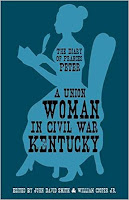New Arrival:
• A Union Woman in Civil War Kentucky: The Diary of Frances Peter edited by John David Smith and William Cooper, Jr. (UP of Ky, 2021).
Eighteen years old at the start of the war, Lexington's Frances D. Peter resided in a divided Border State city. The daughter of US army surgeon Dr. Robert Peter (who worked in the area's military hospitals), she resided in a well to do section of town, her house scarcely a block from that of the secessionist Morgan family that raised Confederate cavalry general John Hunt Morgan. Portions from her 1862-64 diary were published in 1976 under the title Window on the War. Adding a new scholarly introduction along with "more than two hundred additional diary entries, and hundreds of new annotations," John David Smith and William Cooper's A Union Woman in Civil War Kentucky: The Diary of Frances Peter represents a major expansion and modernization of the material. Originally published in hardcover in 2000, this is the 2021 paperback reissue (seemingly unaltered). The information provided in the Peter diary and who wrote it are important additions to Civil War local, military, social, and women's history studies.
Beginning in January 1862 and ending in early April 1864, Peter's "candid diary chronicles Kentucky's invasion by Confederates under General Braxton Bragg in 1862, Lexington's monthlong occupation by General Edmund Kirby Smith, and changes in attitude among the enslaved population following the Emancipation Proclamation. As troops from both North and South took turns holding the city, she repeatedly emphasized the rightness of the Union cause and minced no words in expressing her disdain for 'the secesh.'" Like many other Kentucky Unionists, Peter was a stalwart supporter of the war effort. Though she had no use for Peace Democrats, Peters initially opposed many Lincoln administration policies, including emancipation (though she came to accept it by the fall of 1863).
An epileptic who ultimately succumbed to the condition in 1864 (a seizure event that August led to her death at the age of 21), Peter was often confined to her home, though she did receive an excellent local academy education, visited friends, and attended outside events before and during the war. When she was stuck at home, Peter actively sought news and information about the war beyond her window and relied on a combination of northern newspapers and a local network of female friends and acquaintances to provide it. Indeed, the greater focus of her diary is not on family life but rather outside social and war-related events.
More from the description: "Peter's descriptions of daily events in an occupied city provide valuable insights and a unique feminine perspective on an underappreciated aspect of the war. Until her death in 1864, Peter conscientiously recorded the position and deportment of both Union and Confederate soldiers, incidents at the military hospitals, and stories from the countryside." According to Smith and Cooper, the Peters diary also notes examples of the "assertiveness and empowerment of women necessitated by wartime conditions."



No comments:
Post a Comment
***PLEASE READ BEFORE COMMENTING***: You must SIGN YOUR NAME ( First and Last) when submitting your comment. In order to maintain civil discourse and ease moderating duties, anonymous comments will be deleted. Comments containing outside promotions, self-promotion, and/or product links will also be removed. Thank you for your cooperation.